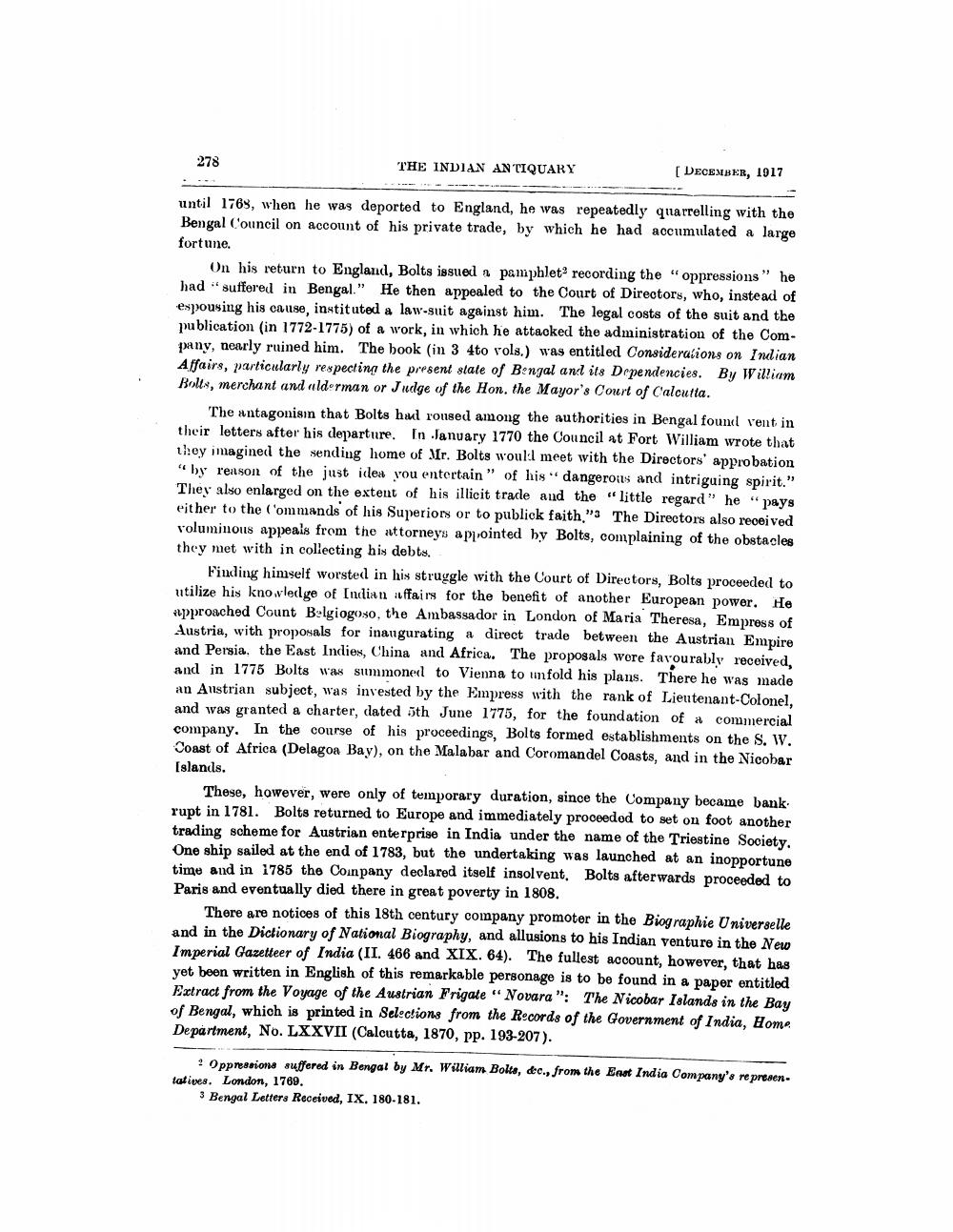________________
278
THE INDIAN ANTIQUARY
[ DECEMBER, 1917
until 1768, when he was deported to England, he was repeatedly quarrelling with the Bengal Council on account of his private trade, by which he had accumulated a large fortune.
On his return to England, Bolts issued a pamphlet' recording the "oppressions" he had ** suffered in Bengal." He then appealed to the Court of Directors, who, instead of espousing his case, instituted a law-suit against him. The legal costs of the suit and the publication (in 1772-1775) of a work, in which he attacked the administration of the Company, nearly ruined him. The book (in 3 4to vols.) was entitled Consideracions on Indian Affairs, particularly respecting the present state of Bengal and its Dependencies. By William Bolts, merchant and alderman or Judge of the Hon. the Mayor's Court of Calcutta.
The antagonisin that Bolts hud roused among the authorities in Bengal found vent in their letters after his departure. In January 1770 the Council at Fort William wrote that they imagined the sending home of Mr. Bolts woull meet with the Directors' approbation " by reason of the just idea you entertain" of his dangerous and intriguing spirit.” They also enlarged on the extent of his illicit trade and the "little regard" he "pays either to the commands of his Superiors or to publick faith": The Directors also received voluminous appeals from the attorneys appointed by Bolts, complaining of the obstacles they met with in collecting his debts.
Finding himself worsted in his struggle with the Court of Directors, Bolts proceeded to utilize his knowledge of Indian affairs for the benefit of another European power. He approached Count Belgiogoso, the Ambassador in London of Maria Theresa, Empress of Austria, with proposals for inaugurating a direct trade between the Austrian Empire and Persia, the East Indies, China and Africa. The proposals were favourably received, and in 1775 Bolts was stummoned to Vienna to tifold his plans. There he was made an Austrian subject, was invested by the Empress with the rank of Lieutenant-Colonel, and was granted a charter, dated 5th June 1775, for the foundation of commercial company. In the course of his proceedings, Bolts formed establishments on the S. W. Coast of Africa (Delagoa Bay), on the Malabar and Coromandel Coasts, and in the Nicobar Islands.
These, however, were only of temporary duration, since the Company became bank rupt in 1781. Bolts returned to Europe and immediately proceeded to set on foot another trading scheme for Austrian enterprise in India under the name of the Triestine Society. One ship sailed at the end of 1783, but the undertaking was launched at an inopportune time and in 1785 the Coinpany declared itself insolvent, Bolts afterwards proceeded to Paris and eventually died there in great poverty in 1808.
There are notices of this 18th century company promoter in the Biographie Universelle and in the Dictionary of National Biography, and allusions to his Indian venture in the New Imperial Gazetteer of India (II. 466 and XIX. 64). The fullest account, however, that has yet been written in English of this remarkable personage is to be found in a paper entitled Extract from the Voyage of the Austrian Frigate "Novara": The Nicobar Islands in the Bau of Bengal, which is printed in Selections from the Records of the Government of India, Home Department, No. LXXVII (Calcutta, 1870, pp. 193-207).
: Oppressione suffered in Bengal by Mr. William Bolta, dec., from the East India Company's represen. tatives. London, 1769.
3 Bengal Letters Received, IX, 180-181.




